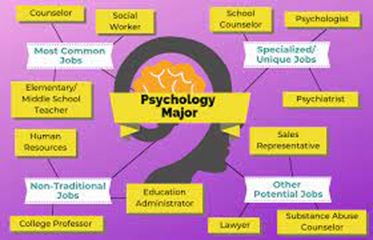
There are many reasons to study psychology, from career prospects to personal interest.
Psychology is a fascinating area of study. It will help you understand human behaviour and mental processes and allow you to better understand how we think act and feel. If you are considering studying psychology you probably already know what an interesting subject it is to study. Our psychology courses look at some of the important questions such as why do people act the way they do? What shapes our personality? How do we learn and change throughout our life? If you are interested in a deeper understanding of the human condition you should consider studying psychology.
This is a good enough reason in itself but there are several other reasons why you should consider a course in psychology.
Career prospects
A psychology degree is one that is increasingly valued by employers who value the analytical and reasoning skills it gives you. Caroline Kennedy, Careers & Opportunities Officer at NCI, has remarked:
“The psychology course has proven incredibly popular because of the sheer range of options that it opens up to graduates. The PSI accreditation means that graduates can pursue further professional training in any number of areas, depending on their particular interest – anything from clinical, educational to occupational psychology, and more. Not every graduate will go on to become a practising psychologist, but they will gain all manner of transferable skills and knowledge, that will be attractive to any employer. With strong research and communication skills, and an understanding of why people act the way they do, graduates could end up working anywhere from marketing, management and HR, to sports or healthcare – it’s a degree that gives you a huge variety of options.”
Further study
Students who choose the BA (Honours) in Psychology
Once you complete your undergraduate degree, you can complete further graduate training in areas such as: Organisational Psychology, Educational Psychology, Forensic Psychology, Clinical Psychology, Counselling Psychology and more.
Top 10 Highest Paying Psychology Jobs in India
1. Psychiatrist
Requiring a very specific trajectory during the educational stage, a psychiatrist has the important responsibility of assigning people diagnoses (based on their evaluations) and making sure that they get the proper medicine.
For the most part, a psychiatrist comes in at a stage when a patient has already gone through various other structures that are designed to support those who are suffering from mental health conditions – a psychiatrist comes into the picture at the last stage of the journey of mental health.
2. Industrial/Organizational Psychologist
Given that a big chunk of the workforce is occupied across industries where there is little to no emotional support to be found for the various workers, it’s no surprise that those psychologists who can fit this role are rewarded generously for their efforts! And their efforts are often deployed not at a personal level only.
The task of industrial and organizational psychologists is to make sure that the structures within which workers are operating can be attuned in a way so that it works out in the favour of both the companies as well as the people involved.
3. Neuropsychologist
Neuropsychology is a field that goes into the depth of the psychology of the brain. A neuropsychologist looks not just at typical psychological indicators that other psychologists use as a reference point.
Their specialty lies in having a thorough understanding of all the different parts of the brain and how they respond to various stimuli – for instance, which part of the brain isn’t functioning well when someone says they’re sad, or which part of the brain produces the feeling of euphoria when one feels a sense of excitement.
4. School Counsellor/Psychologist
The importance of a school psychologist or counsellor cannot be stressed enough. A school psychologist can tie together the social fabric of the school, which is almost always bursting at the seams, with social tensions and strife – for the students, school faculty, as well as management.
In such a scenario, a school counsellor offers respite for everyone involved, and makes sure that a school’s systems function as well as they can (and should).
This is why school psychologists are so important for schools, and why schools invest heavily in them. Moreover, school counsellors also form lasting relationships with their students, and can thus enrich their lives too – and this is a huge form of impact!
5. Clinical Psychologist
A clinical psychologist, much like a psychiatrist, understands all the conditions in which a mental disorder can present itself within a person.
So, a clinical psychologist’s task involves diagnosing, managing, and treating people who have these conditions – whether it be depression, or anxiety, or borderline personality disorder, or anything else. Because of the far reaching implications of this profession, it’s one of the most popular roles within the field of psychology, and has the most number of jobs on offer as well.
Clinical psychologists often work across hierarchies in a number of different organisations, whether at care centres recovery centres, hospitals, or at
6. Forensic Psychologist
Forensic psychologists specialize in psychology as it overlaps in the field of criminality and all things related to it. They work often with criminal offenders, attempting to rehabilitate them at a psychological level, before they go back out into the world. To this end, they can be employed by prisons, institutions that cater to habitual drug offenders, as well as hospitals.
They serve as an important cog in the rehabilitation system for any crime – simply giving them time to reflect on their wrongdoing proves to be futile, unless it’s supported strongly by someone who can facilitate that process.
7. Counselling Psychologist
Counselling psychologists are experts in making people come face to face with their problems and offering them solutions that can be of help to them in the immediate short term.
Counselling offers people an insight into their behaviours that simply going to a psychiatrist or clinical psychologist won’t – this is why these services are often paired together so that in combination th
8. Sports Psychologist
Sports psychologists are psychologists who understand not only the human mind but also the human body – with specific reference to how they interact with each other on and off the field.
A sports psychologist is someone who, ideally, has already gone through the motions of various sports training rituals themselves, and therefore understands the specific toll that it takes on both one’s mind and body.
9. Education Psychologist
An education psychologist fills any possible gaps that are left behind within the schooling system in so far as the education of a student is concerned.
We have earlier seen that there are school psychologists and counsellors who serve to hold students’ anxieties as well as their fears, which may in part be triggered by the school. An education psychologist, however, makes sure that a child’s intellectual growth is taken care of.
Often, a school system doesn’t allow for certain minds to grow at the rate that they will grow the best – and this is where an education psychologist will be far more helpful than a school psychologist or counsellor.
10. Child Psychologist
A child psychologist does what you may imagine they do – they work with children. Children have to face a lot of challenges as they grow up, and parents may not always be in the best position to be able to deal with all of those issues.
In fact, there may be instances when parents specifically approach a child psychologist because they are wondering how to deal with a certain problem that they can’t solve on their own.
A child psychologist helps keep the parents stress free while they focus solely on the child.
Child psychologists too have their own private practice, and as word spreads about their services, they can stand to make a lot of money through this medium

Psychology can help you better understand people around you
Of course a psychology degree won’t give you an absolute understanding of every interaction you have with people. We are quite a complex species after all. However, the insights you gain about peoples’ motivations, perceptions and behaviour will perhaps give you a different perspective on why people react in the ways they do and help you to understand people a little better.
Psychology can help you better understand yourself
The insights you gain into motivations, thought processes, the influences of groups you interact with and many other aspects of human behaviour will all help you gain a better understanding of yourself. Many students find that as they study language, emotion and other topics that they become better communicators as a result of studying psychology.
